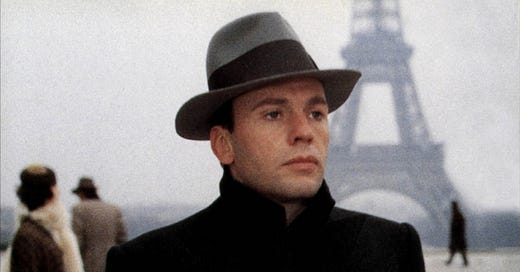I was walking by the Film Forum in lower Manhattan the other night and noticed on the marquee that the 1970 Italian film The Conformist was playing— “due to popular demand” it said on the marquee. I don’t think I’ve ever seen something like that on a marquee before, but I’m sure it happens. Still, it got me thinking—why is there such a popular demand for The Conformist among the bourgeois customer base of the Film Forum?
I decided to check it out. I had heard of it before and on the surface it sounded interesting, but I had never gotten around to seeing it. The theater was packed, and the, mostly older and wealthy, audience was locked in. You could kind of sense that many of them had seen the film before and were returning for their special treat.
I found myself pretty bored throughout most of it. It’s based on a novel, and it feels that way—kind of awkward and clumsy as a film, with lots of zig-zagging flashbacks and so on. It’s about a guy named Marcello who is a member of the fascist secret police in Mussolini’s Italy. He isn’t really a believer in fascism but he is smart enough not to challenge it because he wants to live. He doesn’t have any real communist or liberal values either, he seems to not really believe in anything. He’s fairly devoid of qualities, making for a rather boring protagonist. The film is only 108 minutes but it feels a lot longer, and not in a good way. He is sent from Italy to Paris to assassinate a communist professor who was living there. He brings his boring bourgeois wife along with him. He doesn’t like her but he keeps her around, just like he doesn’t like fascism but he’s part of it.
You can feel the film trying hard to be smart—to be a philosophical film. There’s a scene with references to Plato’s cave, and how it applies to fascism. It’s way too overt and obvious for me, and just made me roll my eyes. Philosophical themes should be more subtext in films—having characters give philosophy lectures in your movie is just stupid. Like a way for dumb people to feel smart.
But I think this is why the rich bourgeois liberals who go to the Film Forum in Manhattan love this movie so much—it makes them feel smart for watching it, or even just for liking it. It is also aesthetically very bourgeois—it feels and looks monumental and important. It takes place within these very grand spaces, fancy hotels and ballrooms, ornate fascist architecture, and so on. Everyone is dressed very nicely and things are framed in dramatic ways. It is a very cold, distant, quiet, and restrained film—except for a few moments of violence and sex.
The bourgeosie prefer art that is like this—cold, distant, quiet. Art that is all about surfaces, while hinting at something beneath the surface (which isn’t really there). I think the rich liberals who love this movie like it because they know that they live like this—cold, distant, quiet, but they like to think that there is more to them, just waiting to come out, under the surface.
I think rich liberals love this movie so much because it takes the idea of being part of something but not really believing in it and makes it seem grand, mysterious, destined, somehow even noble. They know that their bourgeois existences are evil—they have superficial little liberal attachments to social justice things like climate change and anti-racism and so on to make them feel better. Yet these are very trifling in their lives—most of their time and energy is spent being part of the problem. They might not believe in the ruling class evil that they are part of, but they devote their lives to it, and “resist” it in very superficial ways.
This is what Marcello does in the movie. He conforms to fascism, but he never really believes in it—yet this doesn’t change the fact that he carries out his mission of killing the leftist professor. At the end of the film, five years after his mission, Marcello gains a conscience. He sees one of the men who worked under him in the assassination, and he suddenly becomes righteously indignant. He makes a scene and calls that man a fascist and a murderer, and tries to incite an outrage mob against him. He is desperately trying to erase his own complicity with evil by putting it all onto someone else—he’s basically canceling a guy who was lower on the fascist totem pole than he was.
This last bit kind of comes out of nowhere, and it wasn’t clear to me if the people in the theater understood what it was. It’s kind of the moment that makes the whole movie—it is the one real moment of critique of bourgeois complicity, of how they go along with evil and then desperately try to make up for it all at once. But in doing this, they are in fact sinking even deeper into lies. In the final moment of the film, you can kind of see this in Marcello’s face—he expresses some kind of awareness that he is projecting his own evil onto someone else in order to make himself feel better. But he still does it.
For me, it’s this very last moment of the film that makes The Conformist at all interesting and relevant to our current situation. But I doubt that this last moment registers much with the rich liberals who see the movie in such droves that it returns to the Film Forum due to popular demand.





They're the conformists, living their comfortable insulated lives, loving this movie and deep down secretly cheering on that last scene where the fascist boss denounces and tries to instigate a mob against his former subordinate.
It if wasn't real I'd say it was written too trite and on the nose.